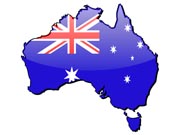Australia unlikely to peel off global vandal tag
 Sydney - It's less than a year since Prime Minister Kevin Rudd brought Australia into line with most developed countries and signed the UN's Kyoto Protocol on curbing the greenhouse gas emissions causing climate change.
Sydney - It's less than a year since Prime Minister Kevin Rudd brought Australia into line with most developed countries and signed the UN's Kyoto Protocol on curbing the greenhouse gas emissions causing climate change.
The Labor Party leader, fresh from his November electoral triumph over John Howard's conservatives, ratified the treaty and joined European leaders in promising to reduce carbon emissions by 60 per cent by 2050. He gave himself 12 months to set an interim target for 2020.
Unlike other rich world leaders, the pressure on Rudd has been to shoulder the least possible burden in dealing with climate change. It's only climatologists and green lobbyists who have called on Canberra to be bold rather than remain a laggard.
"To be a credible global player," Australian Conservation Foundation head Don Henry said, "Australia's target must be within the range already on the table of the international negotiations, which have recognized that developed countries, as a group, need to cut their carbon pollution by at least 25-40 per cent by 2020 to keep global warming below dangerous levels."
It's looking likely that, before the end of the year, Rudd will commit Australia to a 10-per-cent cut - and that only if the rest of the world signs up to the successor to Kyoto that is set to be negotiated in Copenhagen next year. If agreement is not forthcoming, Rudd is expected to set a 5-per-cent target. The carbon-trading scheme, scheduled to be introduced in 2010, would be put on idle pending a post-Kyoto agreement.
Rudd flagged a low target in September when his top climate change advisor, economist Ross Garnaut, delivered an interim report recommending a 10-per-cent target for
2010. Implying that Garnaut was advocating an acceptable compromise, Rudd said that "some people will say we've done too much and others will say we've not done enough."
Climate Change Minister Penny Wong is resisting calls that Australia not set a target and procrastinate on carbon trading. "We can't expect to influence the shape of a new international agreement if we can't demonstrate that we're taking responsibility," she said.
The opposition Liberal Party is not applying any political pressure on Rudd to show leadership or for Australia to ditch its free-rider position. Liberal leader Brendan Nelson says Australia should not embrace an emissions reduction target until big developing countries like China and India do the same and that an emissions trading scheme should only kick into gear when they do.
Garnaut is not optimistic that Copenhagen will deliver a global agreement. He reckons that a low target - even one that won't stop temperatures rising - is the government's best position because it has the best chance of being adopted. A high target, he argues, would give developing countries a better excuse for not joining.
Garnaut has proved an inspired choice: Rudd can accept his advice on targets and let the economist himself wear the criticism from scientists and green groups.
It's coming thick and fast.
"He appears to be putting the problem in the 'too hard' basket and taking a weak or easy option, leaving it to other generations to solve the problem," said Melbourne University climatologist David Karoly.
Australians are among the most polluting people on a per capita basis mostly because of a reliance on coal for electricity generation. Rudd has assured coal miners that their jobs are safe. He's also pledged that relatively clean nuclear power will not be harnessed.
Garnaut has told Australians that his recommendations would not be painful if adopted. A 10-per-cent cut by 2020 would lower Gross Domestic Product by 1.1 per cent. (dpa)